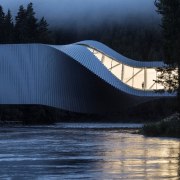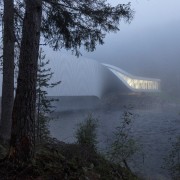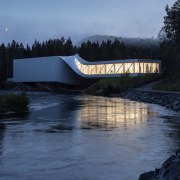The Twist Museum – bridging art and nature
Completing the cultural route through northern Europe’s largest sculpture park, The Twist Museum by respected architect group Bjarke Ingels Group (BIG) makes it look like you might need to pull on your anti-gravity boots to continue the journey – but fear not!
Designed by Bjarke Ingels Group – BIG
From the architects:
Traversing the winding Randselva river, BIG’s first project in Norway, The Twist, opens as an inhabitable bridge torqued at its center, forming a new journey and art piece within the Kistefos Sculpture Park in Jevnaker, Norway.
Kistefos’ new 1,000m² contemporary art institution doubles as infrastructure to connect two forested riverbanks, completing the cultural route through northern Europe’s largest sculpture park.
Built around a historical pulp mill, The Twist is conceived as a beam warped 90 degrees near the middle to create a sculptural form as it spans the Randselva. Visitors roaming the park’s site-specific works by international artists such as Anish Kapoor, Olafur Eliasson, Lynda Benglis Yayoi Kusama, Jeppe Hein, and Fernando Botero, among others, cross The Twist to complete the art tour.
As a second bridge and natural extension to the park, the new museum transforms the visitor experience while doubling Kistefos’ indoor exhibition space.
A simple twist in the building’s volume allows the bridge to lift from the lower, forested riverbank in the south up to the hillside area in the north.
As a continuous path in the landscape, both sides of the building serve as the main entrance. From the south entry, visitors cross a 16m aluminium-clad steel bridge to reach the double-height space with a clear view to the north end, similarly linked with a 9m pedestrian bridge.
"The Twist has been an extremely complex building to construct, yet the result is simple and striking. From an array of straight elements, the museum was constructed in an industrial manner as both a piece of infrastructure and as a building reflecting its natural surroundings. As you approach The Twist, you start to notice the museum reflecting the trees, the hills, and the water below, constantly glimmering and changing its appearance in dialogue with nature."
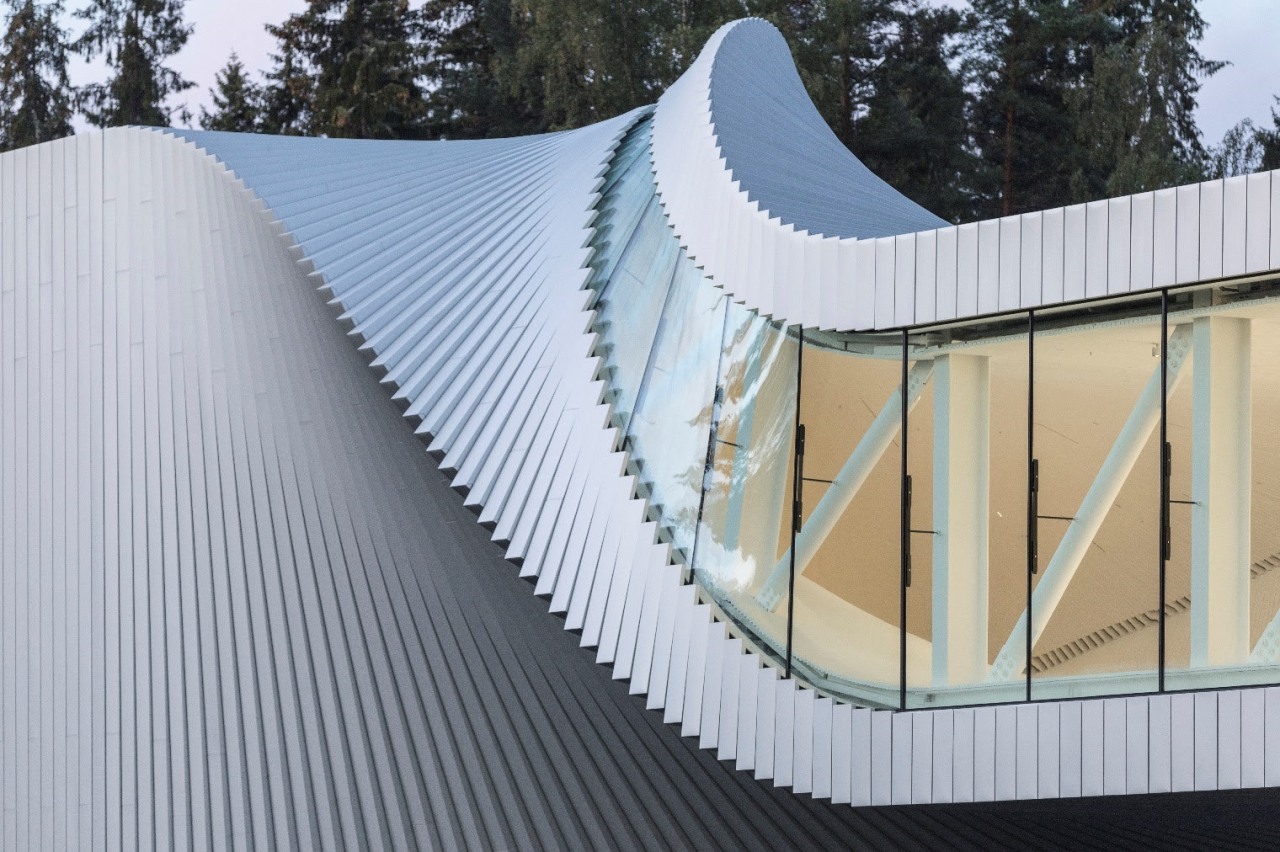
The double-curved geometry of the museum is comprised of straight 40cm wide aluminium panels arranged like a stack of books, shifted ever so slightly in a fanning motion.
The same principle is used inside with white painted 8cm wide fir slats cladding the floor, wall, and ceiling as one uniform backdrop for Kistefos’ short-term Norwegian and international exhibitions.
From either direction, visitors experience the twisted gallery as though walking through a camera shutter.
On the north end, a full-height glass wall offering panoramic views to the pulp mill and river tapers while curving upwards to form a 25cm wide strip of skylight.

Due to the curved form of the glass windows, the variety of daylight entering the museum creates three distinctive galleries: a wide, naturally lit gallery with panoramic views on the north side; a tall, dark gallery with artificial lighting on the south side; and, in between, a sculptural space with a twisted sliver of roof light.
The ability to compartmentalise, divide or merge the gallery spaces create flexibility for Kistefos’ artistic programming.
"The Twist constitutes a tectonic enigma. As the bridge connects the two riverbanks – a mountain slope and flat forest – it rotates 40 degrees, forming a warped, ruled surface. Two pure functional forms united by complex curvature. Wherever you look, you see arches and curves, Fibonacci spirals and saddle shapes, but when you look closer you realise that everything is created from straight lines – straight sheets of aluminium, straight boards of wood. An expressive organic sculpture composed of rational repetitive elements."
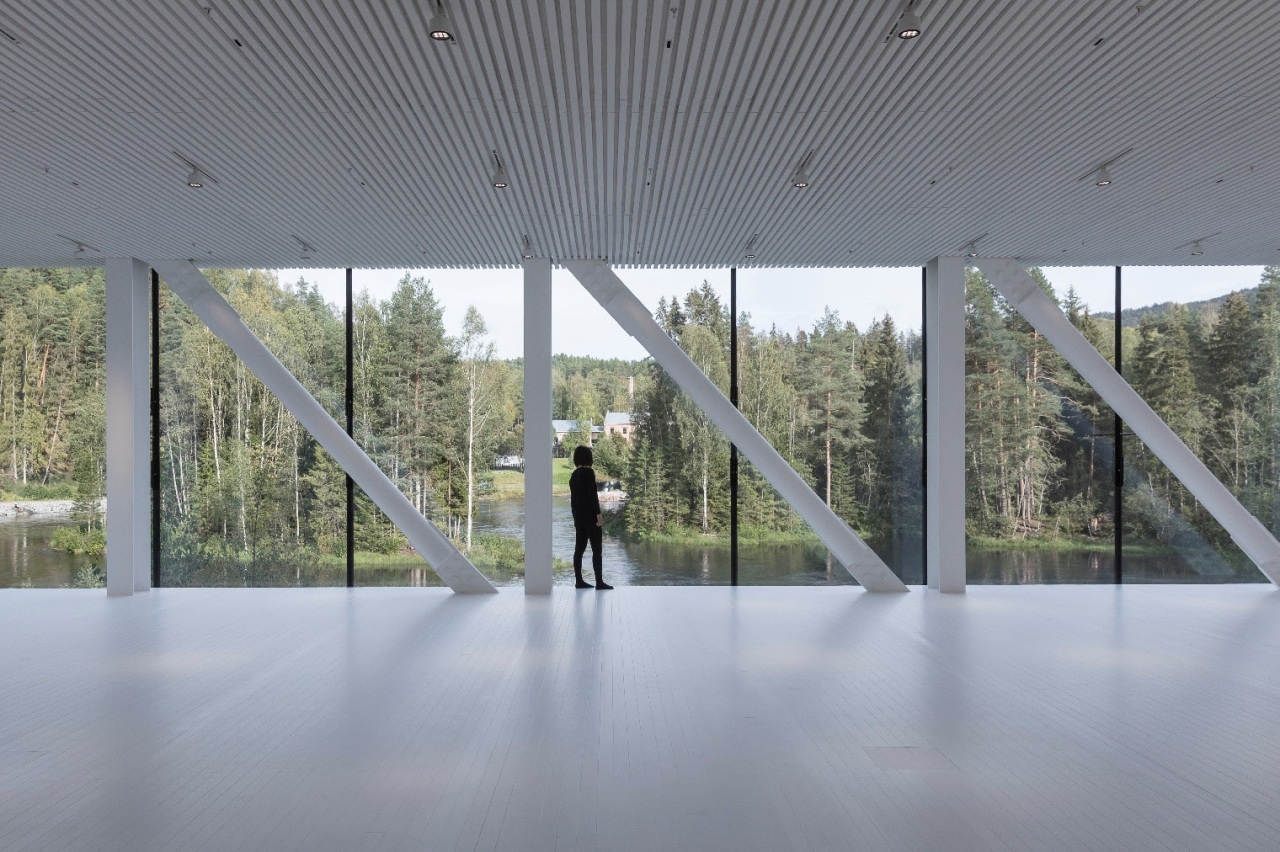
A glass stairway leads down to the museum’s lower level on the north river embankment, where the building’s aluminium underside becomes the ceiling for the basement and restroom area.
Another full-width glass wall brings visitors even closer to the river below, enhancing the overall immersive experience of being in the idyllic woodlands outside of Oslo.
Credit list
Client
Architect
Project architect
Project
Location
Partners in charge
Facade
Story by: Trendsideas
Photography by: Laurian Ghinitoiu, Einar Aslaksen
Home kitchen bathroom commercial design

